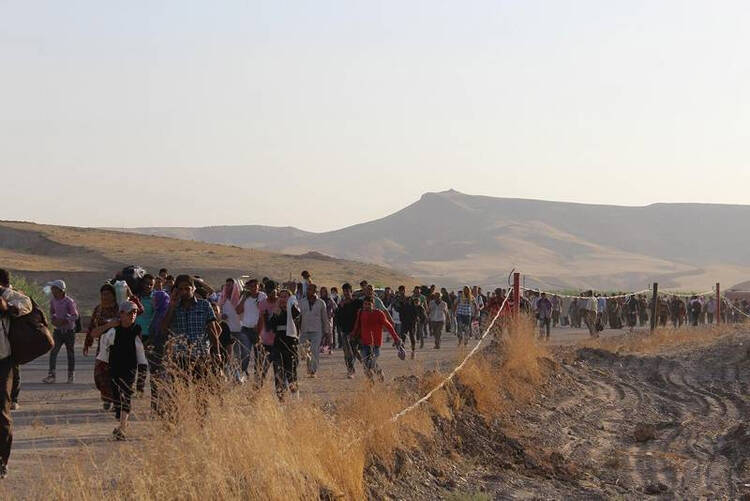The U.N. refugee agency said on Tuesday some 30,000 Syrians had streamed into northern Iraq since last week and thousands more were waiting to enter, fleeing communities across a wide swathe of northern Syria. "With several tens of thousands of people having crossed since last week, this new exodus from Syria is among the largest we have so far seen during the conflict, which is now into its third year," UNHCR spokesman Dan McNorton told a news briefing.
"As of this morning, a further 2,000-3,000 people were reported waiting close to the Syrian side of the border, and expected to cross today," he said.
On Monday more than 4,800 people entered at Sahela, some 120 kilometres northwest of Mosul. Some were from Malikiyye city in the neighbouring Syrian governorate of al-Hasakah and told UNHCR they had fled an aerial bombardment that morning. Others arriving over the past few days were from further west, including Efrin and Aleppo, plus Al Hasakah and Al Qamishly.
"As well as people who told us they were fleeing recent bombings, others say they were escaping fighting and tension amongst various factions on the ground," McNorton said. "Also cited was the collapse of the economy due to war and the resulting difficulties in caring for their families."
The influx began last Thursday when the Kurdistan Regional Government authorities in northern Iraq suddenly opened access to the temporary Peshkhabour pontoon bridge north of Sahela, allowing several hundred people camped in the area since earlier last week to enter Iraq.
By the following morning thousands of people had swarmed across the swaying bridge over the Tigris. As of Saturday, UNHCR estimates 20,000 Syrians had crossed the Peshkhabour bridge. McNorton said they were followed by another 6,000 people on Sunday when fleeing Syrians were directed to use the Sahela border crossing, south of Peshkhabour.
In response to the influx UNHCR and partner agency teams have erected shelters to provide shade. Water and food distributions have also been set up at crossing points. The International Organization for Migration and the Kurdistan Regional Government have provided buses and trucks to move the thousands of people from the border zone deeper into Iraq.
As the refugee exodus suddenly worsened this week, Syrian opposition activists claimed today that the government forces attacked a pro-rebel Damascus suburb with chemical weapons, killing several hundred people. If the attack is confirmed and its scale matches opposition claims, it would be one of the worst chemical weapons attacks ever. Estimates of the death toll varied on Wednesday, but one opposition group put the total number of deceased at 755. Videos uploaded to the Internet and purporting to show the scene of the attack in Ghouta, depict gruesome scenes, including infants struggling for breath and neatly lined rows of corpses.
"Many of the casualties are women and children. They arrived with their pupils dilated, cold limbs and foam in their mouths. The doctors say these are typical symptoms of nerve gas victims," Bayan Baker, a nurse in Douma, told Reuters.
Responding the the new wave of refugees into Iraq, in Erbil Governorate, further to the east, UNHCR has established a transit site at Kawergost, to the north of Erbil town and in Khabat District. One thousand one hundred UNHCR tents have been erected there along with 200 tents assembled by the International Rescue Committee. The Kawergost transit site is now sheltering some 7,000 to 9,000 Syrians. The President of the Kurdistan Region, Massoud Barzani, visited the transit site yesterday.
Over the past days UNHCR has dispatched more than 90 trucks carrying aid from Erbil. Relief items have also been distributed, including tents, plastic tarpaulins, sleeping mats, blankets, kitchen sets, hygienic supplies, water tanks, portable latrines, portable showers and electric fans. However, because of the scale and speed of the influx, some people at Kawergost are still without tents and having to camp under tarpaulins or other makeshift shelters.
Yesterday, the authorities provided access for UNHCR to a warehouse in Bahrak and 2,500 Syrians are now being housed at this facility. Additional land has been identified in Erbil’s Qusthtapa district where a further transit site will be established. As well as those in tented accommodation, some 14,000 people are living with host families or are encamped at mosques in the Erbil region.
Further to the southeast, at Sulaimaniyah, 4,000 people are currently accommodated temporarily in 11 schools. As in Erbil, a temporary site is being set up. Some 3,000 people who arrived yesterday (Monday) were transferred to Sulemaniyah.
As of this morning, a further 2,000-3,000 people were reported waiting close to the Syrian side of the border and expected to cross today. On the Syrian side, the border at Sahela is under the control of Syrian Kurdish forces. The Kurdistan Regional Government has identified an additional site in Kushtapa where it has indicated that UNHCR may establish a further transit camp.
To boost stockpiles of rapidly depleting aid supplies within Iraq, UNHCR has sent 15 tractor trailer trucks to northern Iraq from its main regional stockpile in Amman. That shipment, expected to arrive before the end of the week, includes more than 3,100 tents, two pre-fabricated warehouses and jerry cans. Additional supplies are currently being organised.
Longer term, in cooperation with the Kurdish Regional Government, UNHCR and its partners are building the Darashakran camp, which is expected to be ready to accommodate refugees within a matter of weeks.
UNHCR built Domiz refugee camp near Dohuk, Iraq earlier this year. Domiz, originally constructed to accommodate 15,000 Syrian refugees, is currently overcrowded with more than 55,000 residents – meaning that new arrivals are having to be accommodated elsewhere. Prior to this latest influx, UNHCR had registered 155,000 Syrian refugees in Iraq.








